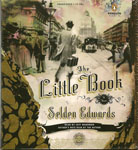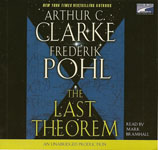
 The Little Book
The Little Book
By Selden Edwards; Read by Jeff Woodman
13 CDs – 15 Hours – [UNABRIDGED]
Publisher: Penguin Audio
Published: Aug 2008
ISBN: 9780143143512
The Little Book is the extraordinary tale of Wheeler Burden, California-exiled heir of the famous Boston banking Burdens, philosopher, student of history, legend’s son, rock idol, writer, lover of women, recluse, half-Jew, and Harvard baseball hero. In 1988 he is forty-seven, living in San Francisco. Suddenly he is—still his modern self—wandering in a city and time he knows mysteriously well: fin de siècle Vienna. It is 1897, precisely ninety-one years before his last memory and a half-century before his birth.
It’s not long before Wheeler has acquired appropriate clothes, money, lodging, a group of young Viennese intellectuals as friends, a mentor in Sigmund Freud, a bitter rival, a powerful crush on a luminous young American woman, a passing acquaintance with local celebrity Mark Twain, and an incredible and surprising insight into the dashing young war-hero father he never knew.
But the truth at the center of Wheeler’s dislocation in time remains a stubborn mystery that will take months of exploration and a lifetime of memories to unravel and that will, in the end, reveal nothing short of the eccentric Burden family’s unrivaled impact on the very course of the coming century. The Little Book is a masterpiece of unequaled storytelling that announces Selden Edwards as one of the most dazzling, original, entertaining, and inventive novelists of our time.
 The Last Theorem
The Last Theorem
By Arthur C. Clarke and Frederick Pohl; Read by Mark Bramhall
10 CDs – 11 Hours – [UNABRIDGED]
Publisher: Books on Tape
Published: 2008
Two of science fiction’s most renowned writers join forces for a storytelling sensation. The historic collaboration between Frederik Pohl and his fellow founding father of the genre, Arthur C. Clarke, is both a momentous literary event and a fittingly grand farewell from the late, great visionary author of 2001: A Space Odyssey.
The Last Theorem is a story of one man’s mathematical obsession, and a celebration of the human spirit and the scientific method. It is also a gripping intellectual thriller in which humanity, facing extermination from all-but-omnipotent aliens, the Grand Galactics, must overcome differences of politics and religion and come together . . . or perish.
In 1637, the French mathematician Pierre de Fermat scrawled a note in the margin of a book about an enigmatic theorem: “I have discovered a truly marvelous proof of this proposition which this margin is too narrow to contain.” He also neglected to record his proof elsewhere. Thus began a search for the Holy Grail of mathematics–a search that didn’t end until 1994, when Andrew Wiles published a 150-page proof. But the proof was burdensome, overlong, and utilized mathematical techniques undreamed of in Fermat’s time, and so it left many critics unsatisfied–including young Ranjit Subramanian, a Sri Lankan with a special gift for mathematics and a passion for the famous “Last Theorem.”
When Ranjit writes a three-page proof of the theorem that relies exclusively on knowledge available to Fermat, his achievement is hailed as a work of genius, bringing him fame and fortune. But it also brings him to the attention of the National Security Agency and a shadowy United Nations outfit called Pax per Fidem, or Peace Through Transparency, whose secretive workings belie its name. Suddenly Ranjit–together with his wife, Myra de Soyza, an expert in artificial intelligence, and their burgeoning family–finds himself swept up in world-shaking events, his genius for abstract mathematical thought put to uses that are both concrete and potentially deadly.
Meanwhile, unbeknownst to anyone on Earth, an alien fleet is approaching the planet at a significant percentage of the speed of light. Their mission: to exterminate the dangerous species of primates known as homo sapiens.
Posted by Scott D. Danielson

 The Little Book
The Little Book


